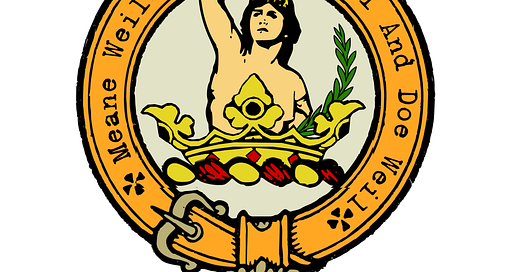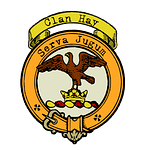Welcome back to the "A Clan A Day Podcast," brought to you by bagtownclans.com. I'm your host, Colin MacDonald, and today, we're diving into the rich and fascinating history of Clan Urquhart, a Highland clan whose legacy stretches back to ancient times, despite being a smaller, lesser-known family in comparison to some of the more famous Scottish clans. Nevertheless, the Urquharts have carved out a distinct place in Scottish history, and their story is full of colorful characters, remarkable feats, and a bit of eccentricity.
The origins of Clan Urquhart can be traced to the district of Cromarty on the Black Isle, where the family held lands as early as the 12th century. Their name, like many Scottish clans, is tied to their homeland, specifically the barony of Urquhart in Cromarty. There’s also the famous Urquhart Castle, which stands on the shores of Loch Ness, a striking ruin that has long captured the imaginations of visitors and historians alike. Although there’s no solid evidence that Clan Urquhart had direct ties to Urquhart Castle itself, the association with the name has become an enduring part of their identity.
Clan Urquhart’s early history is shrouded in legend. According to Nisbet, a brother of Ochonchar, who is said to have slain a bear and was the ancestor of the Lords Forbes, took on the surname of Urquhart while serving as keeper of Urquhart Castle. This would make the Urquharts a cadet branch of the larger Forbes family, but the real details of their origins remain somewhat elusive. Sir Thomas Urquhart, the clan’s eccentric 17th-century genealogist, had his own take. He claimed that the name "Urquhart" derived from "Ourohartos," meaning "fortunate and well-beloved," and even traced his ancestry all the way back to Adam and Eve! While this fantastical genealogy might have been more a product of creative storytelling than historical fact, it does reflect the colorful spirit of the clan.
By the 13th century, the Urquharts were already well-established in Cromarty, and by the time of King Robert the Bruce, they had risen to significant prominence. William Urquhart of Cromarty is recorded as the heritable sheriff of Cromarty during the Wars of Scottish Independence, making the family one of the most powerful in the region. His marriage to a daughter of Hugh, Earl of Ross, further cemented the Urquhart’s status in the Highlands, bringing them valuable lands and alliances.
One of the most notable figures in Clan Urquhart’s early history is Thomas Urquhart of Cromarty, who, according to family tradition, fathered an astonishing 25 sons and 11 daughters in the early 16th century. Seven of his sons died at the Battle of Pinkie in 1547, a devastating conflict during the Anglo-Scottish wars. The family’s loss at Pinkie was profound, but it did not diminish their resolve or influence in the region.
The most famous Urquhart of all, however, is undoubtedly Sir Thomas Urquhart, the celebrated scholar and eccentric of the 17th century. Born in 1611, Sir Thomas was an intellectual who studied at King’s College, Aberdeen, and traveled extensively in Europe. His claim to fame, aside from his wildly imaginative genealogies, was his translation of the works of French writer François Rabelais. Sir Thomas’s version of Gargantua and Pantagruel is still considered one of the finest English translations of that bawdy and humorous text. But Sir Thomas was more than just a scholar; he was also a fierce royalist. During the English Civil War, he fought on the side of King Charles I and was knighted by the king in 1641. He later joined Charles II’s army during the ill-fated march into England, and after the Battle of Worcester in 1651, he was taken prisoner by Cromwell’s forces and had his estates forfeited.
Despite his setbacks, Sir Thomas never lost his indomitable spirit. Even while imprisoned, he continued writing, publishing works on everything from geometry to universal languages. There’s even a legendary tale that Sir Thomas died of laughter upon hearing the news of Charles II’s restoration to the throne in 1660—an ending as eccentric and grand as the man himself.
Following Sir Thomas’s death, the fortunes of Clan Urquhart declined somewhat, with their lands passing into the hands of the Mackenzies, who became the Earls of Cromarty. However, the clan remained resilient. In the 18th century, members of the Urquhart family were involved in the Jacobite uprisings, with Colonel James Urquhart fighting bravely at the Battle of Sheriffmuir in 1715, where he was severely wounded.
In more recent times, the clan’s chiefship passed to an American branch of the family. In the 20th century, Wilkins Fisk Urquhart, a descendant of the Urquharts who emigrated to the United States, established his right as chief of Clan Urquhart. Today, his son, Colonel Wilkins Urquhart of Urquhart, is the 28th chief, continuing the legacy of this remarkable family.
Though the Urquharts may not be one of the largest clans in Scotland, their history is no less significant. From their ancient roots in Cromarty to their involvement in some of Scotland’s most pivotal moments, Clan Urquhart has proven itself to be a family of resilience, intellect, and a healthy dose of eccentricity. Their motto, "Meane weil, speak weil, and doe weil," is a fitting testament to their enduring spirit.
Thank you for joining us today on the "A Clan A Day Podcast." Be sure to tune in tomorrow as we continue our journey through Scotland’s rich tapestry of clans. I'm Colin MacDonald, and as always, go n-éirí an bóthar leat.













Share this post